Legal Analysis of the Enron Scandal: Director's Duties and Company Law
VerifiedAdded on 2020/10/22
|6
|1154
|426
Project
AI Summary
This project offers a detailed legal analysis of the Enron scandal, focusing on key issues within UK company law. It examines the context of the Enron scandal, including the role of Arthur Anderson and the financial reporting irregularities that led to the company's bankruptcy. The analysis delves into the legal arguments surrounding the recovery of loans by Kenneth Lay during the company's insolvency. Furthermore, it scrutinizes the duties of directors as outlined in the Companies Act 2006, highlighting the breaches committed by directors such as Louis Bourget and Andrew Fastow. The project explores the seven general duties of directors, specifically focusing on the failure to declare interests, the acceptance of benefits from third parties, and the failure to promote the company's success. The analysis references key legal principles, case law, and relevant academic literature to support its arguments, providing a comprehensive understanding of the legal and ethical failures within the Enron scandal.
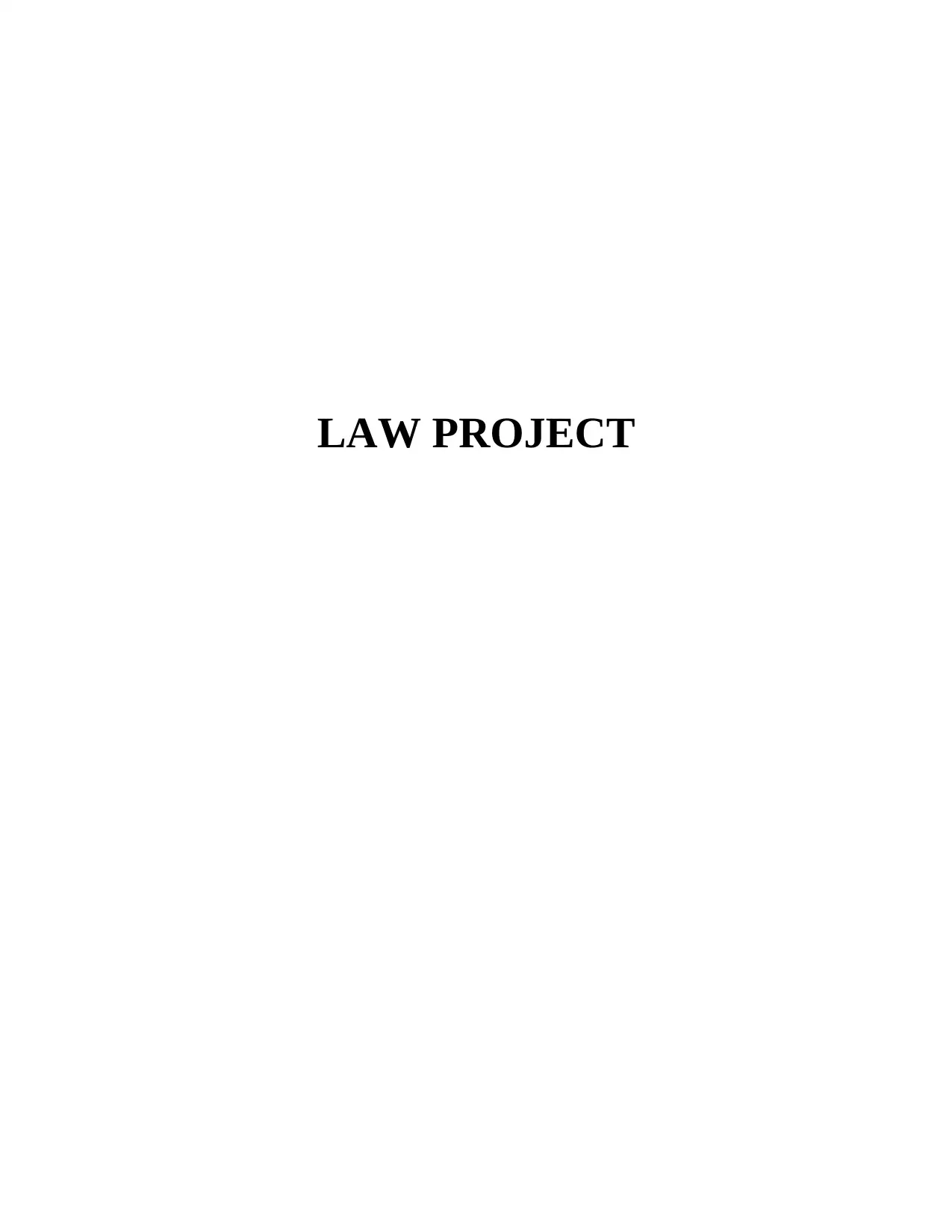
LAW PROJECT
Paraphrase This Document
Need a fresh take? Get an instant paraphrase of this document with our AI Paraphraser
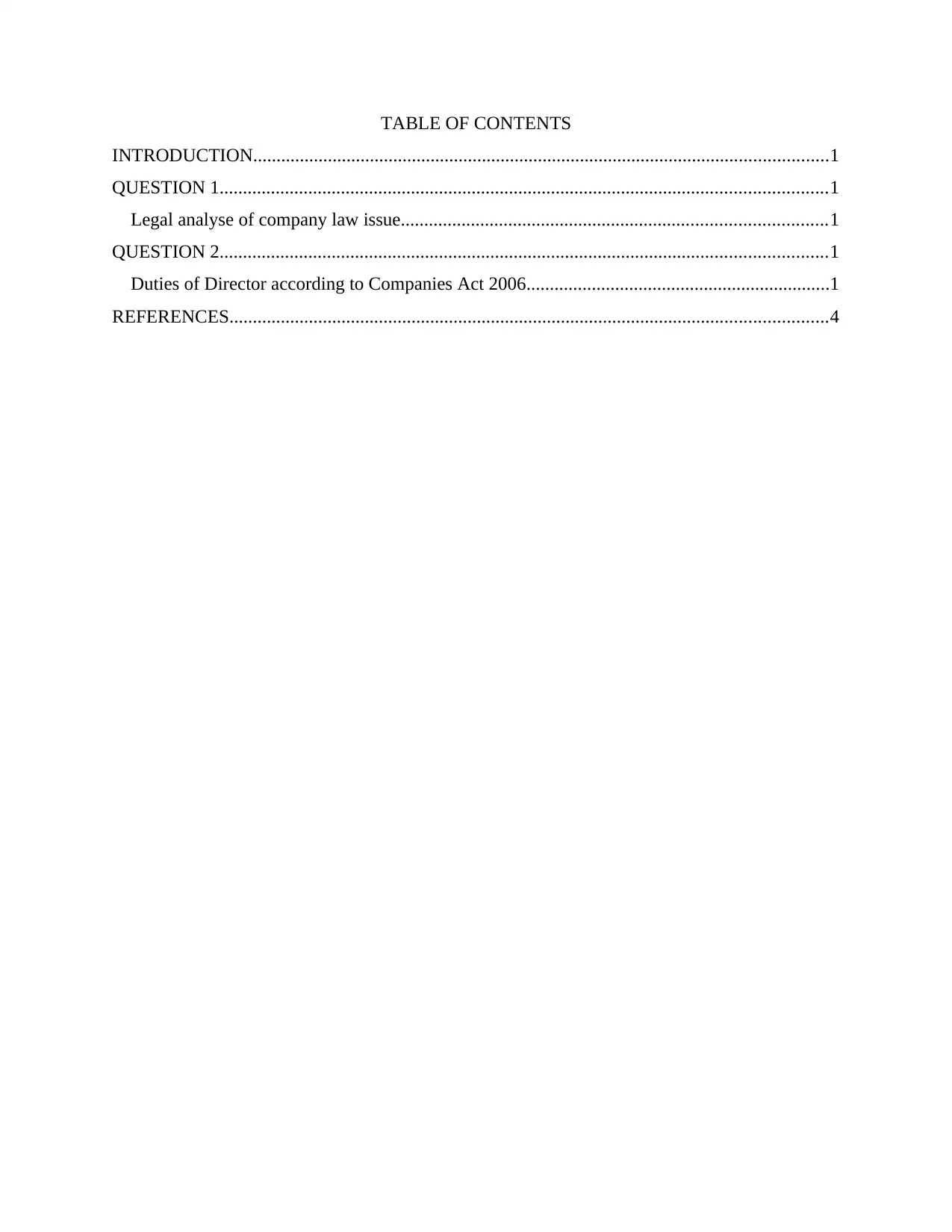
TABLE OF CONTENTS
INTRODUCTION...........................................................................................................................1
QUESTION 1..................................................................................................................................1
Legal analyse of company law issue...........................................................................................1
QUESTION 2..................................................................................................................................1
Duties of Director according to Companies Act 2006.................................................................1
REFERENCES................................................................................................................................4
INTRODUCTION...........................................................................................................................1
QUESTION 1..................................................................................................................................1
Legal analyse of company law issue...........................................................................................1
QUESTION 2..................................................................................................................................1
Duties of Director according to Companies Act 2006.................................................................1
REFERENCES................................................................................................................................4
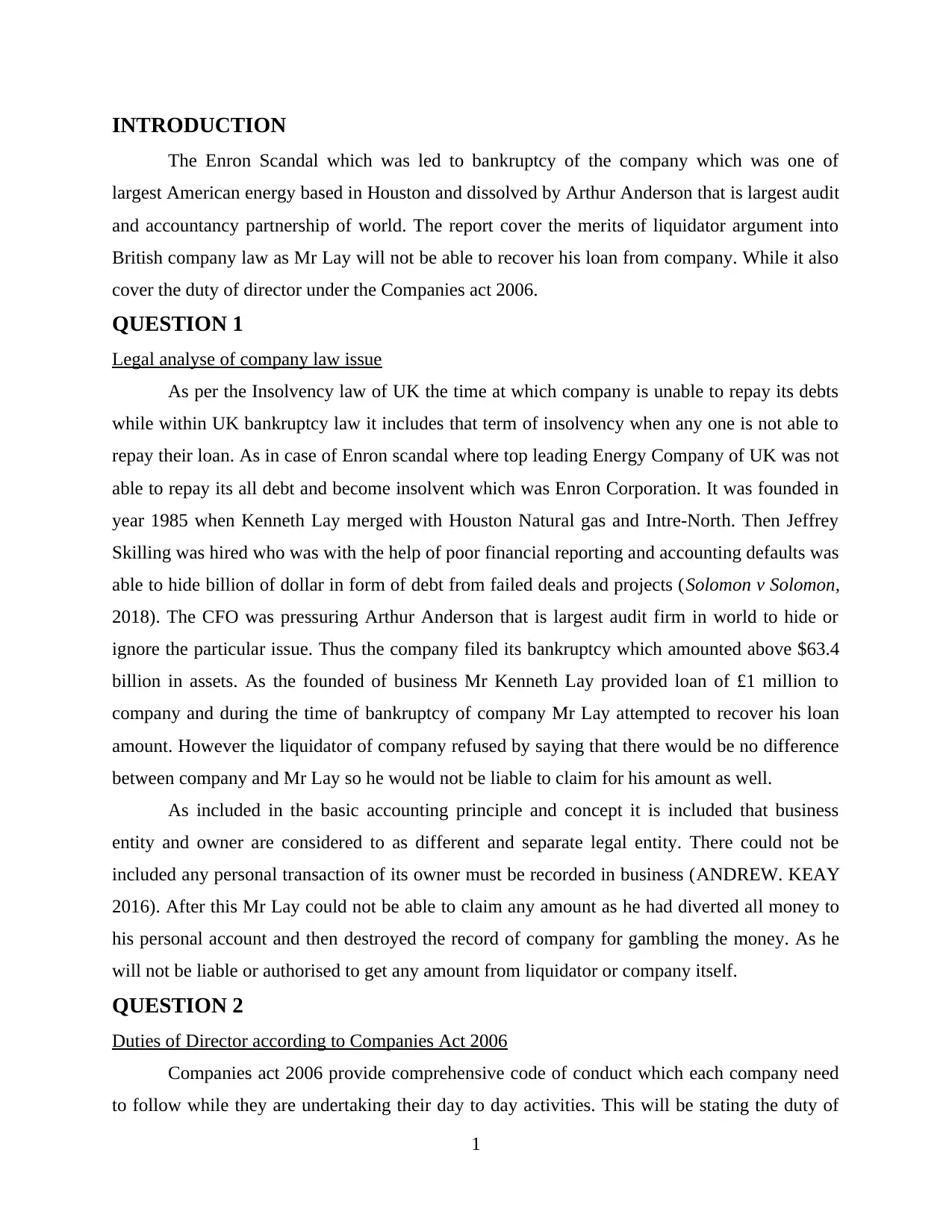
INTRODUCTION
The Enron Scandal which was led to bankruptcy of the company which was one of
largest American energy based in Houston and dissolved by Arthur Anderson that is largest audit
and accountancy partnership of world. The report cover the merits of liquidator argument into
British company law as Mr Lay will not be able to recover his loan from company. While it also
cover the duty of director under the Companies act 2006.
QUESTION 1
Legal analyse of company law issue
As per the Insolvency law of UK the time at which company is unable to repay its debts
while within UK bankruptcy law it includes that term of insolvency when any one is not able to
repay their loan. As in case of Enron scandal where top leading Energy Company of UK was not
able to repay its all debt and become insolvent which was Enron Corporation. It was founded in
year 1985 when Kenneth Lay merged with Houston Natural gas and Intre-North. Then Jeffrey
Skilling was hired who was with the help of poor financial reporting and accounting defaults was
able to hide billion of dollar in form of debt from failed deals and projects (Solomon v Solomon,
2018). The CFO was pressuring Arthur Anderson that is largest audit firm in world to hide or
ignore the particular issue. Thus the company filed its bankruptcy which amounted above $63.4
billion in assets. As the founded of business Mr Kenneth Lay provided loan of £1 million to
company and during the time of bankruptcy of company Mr Lay attempted to recover his loan
amount. However the liquidator of company refused by saying that there would be no difference
between company and Mr Lay so he would not be liable to claim for his amount as well.
As included in the basic accounting principle and concept it is included that business
entity and owner are considered to as different and separate legal entity. There could not be
included any personal transaction of its owner must be recorded in business (ANDREW. KEAY
2016). After this Mr Lay could not be able to claim any amount as he had diverted all money to
his personal account and then destroyed the record of company for gambling the money. As he
will not be liable or authorised to get any amount from liquidator or company itself.
QUESTION 2
Duties of Director according to Companies Act 2006
Companies act 2006 provide comprehensive code of conduct which each company need
to follow while they are undertaking their day to day activities. This will be stating the duty of
1
The Enron Scandal which was led to bankruptcy of the company which was one of
largest American energy based in Houston and dissolved by Arthur Anderson that is largest audit
and accountancy partnership of world. The report cover the merits of liquidator argument into
British company law as Mr Lay will not be able to recover his loan from company. While it also
cover the duty of director under the Companies act 2006.
QUESTION 1
Legal analyse of company law issue
As per the Insolvency law of UK the time at which company is unable to repay its debts
while within UK bankruptcy law it includes that term of insolvency when any one is not able to
repay their loan. As in case of Enron scandal where top leading Energy Company of UK was not
able to repay its all debt and become insolvent which was Enron Corporation. It was founded in
year 1985 when Kenneth Lay merged with Houston Natural gas and Intre-North. Then Jeffrey
Skilling was hired who was with the help of poor financial reporting and accounting defaults was
able to hide billion of dollar in form of debt from failed deals and projects (Solomon v Solomon,
2018). The CFO was pressuring Arthur Anderson that is largest audit firm in world to hide or
ignore the particular issue. Thus the company filed its bankruptcy which amounted above $63.4
billion in assets. As the founded of business Mr Kenneth Lay provided loan of £1 million to
company and during the time of bankruptcy of company Mr Lay attempted to recover his loan
amount. However the liquidator of company refused by saying that there would be no difference
between company and Mr Lay so he would not be liable to claim for his amount as well.
As included in the basic accounting principle and concept it is included that business
entity and owner are considered to as different and separate legal entity. There could not be
included any personal transaction of its owner must be recorded in business (ANDREW. KEAY
2016). After this Mr Lay could not be able to claim any amount as he had diverted all money to
his personal account and then destroyed the record of company for gambling the money. As he
will not be liable or authorised to get any amount from liquidator or company itself.
QUESTION 2
Duties of Director according to Companies Act 2006
Companies act 2006 provide comprehensive code of conduct which each company need
to follow while they are undertaking their day to day activities. This will be stating the duty of
1
⊘ This is a preview!⊘
Do you want full access?
Subscribe today to unlock all pages.

Trusted by 1+ million students worldwide
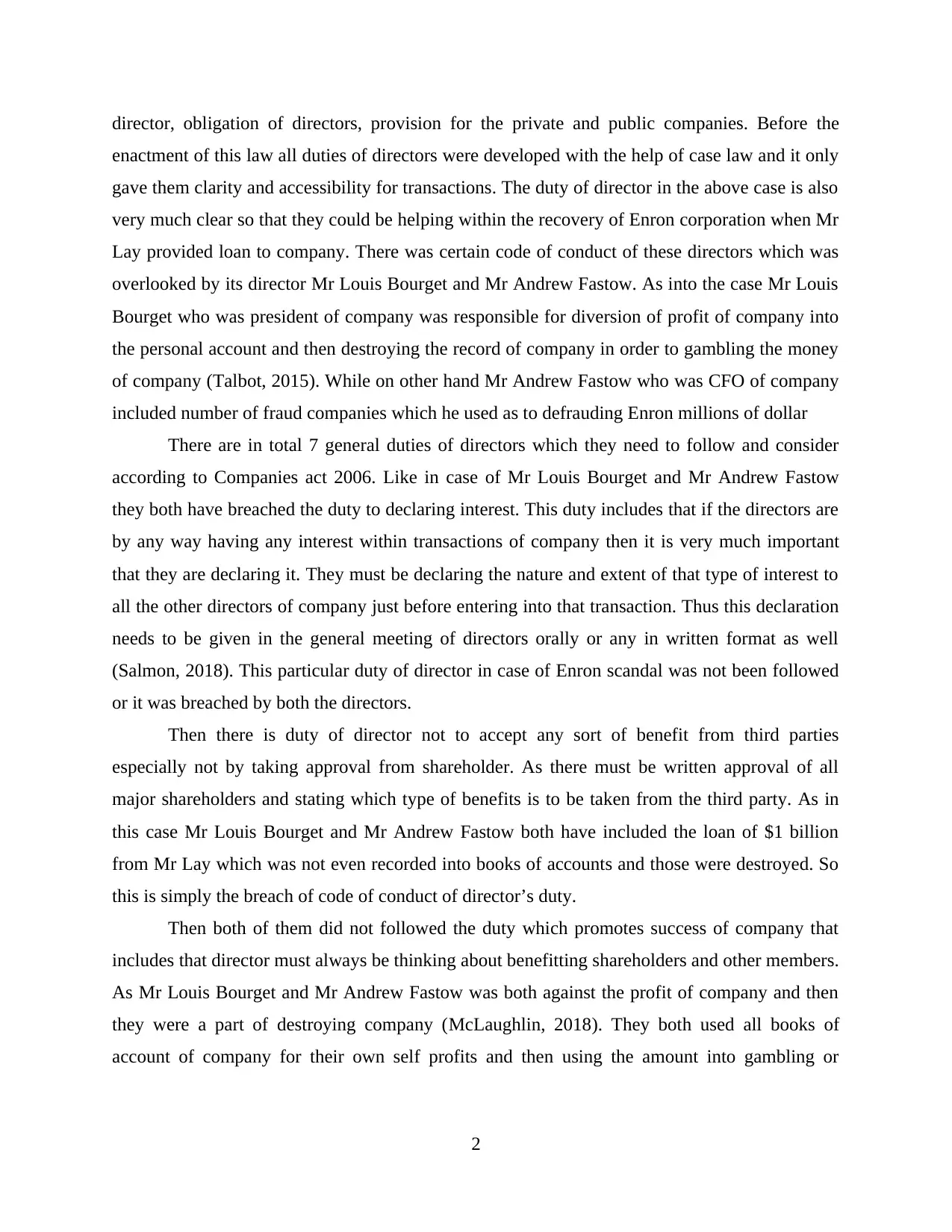
director, obligation of directors, provision for the private and public companies. Before the
enactment of this law all duties of directors were developed with the help of case law and it only
gave them clarity and accessibility for transactions. The duty of director in the above case is also
very much clear so that they could be helping within the recovery of Enron corporation when Mr
Lay provided loan to company. There was certain code of conduct of these directors which was
overlooked by its director Mr Louis Bourget and Mr Andrew Fastow. As into the case Mr Louis
Bourget who was president of company was responsible for diversion of profit of company into
the personal account and then destroying the record of company in order to gambling the money
of company (Talbot, 2015). While on other hand Mr Andrew Fastow who was CFO of company
included number of fraud companies which he used as to defrauding Enron millions of dollar
There are in total 7 general duties of directors which they need to follow and consider
according to Companies act 2006. Like in case of Mr Louis Bourget and Mr Andrew Fastow
they both have breached the duty to declaring interest. This duty includes that if the directors are
by any way having any interest within transactions of company then it is very much important
that they are declaring it. They must be declaring the nature and extent of that type of interest to
all the other directors of company just before entering into that transaction. Thus this declaration
needs to be given in the general meeting of directors orally or any in written format as well
(Salmon, 2018). This particular duty of director in case of Enron scandal was not been followed
or it was breached by both the directors.
Then there is duty of director not to accept any sort of benefit from third parties
especially not by taking approval from shareholder. As there must be written approval of all
major shareholders and stating which type of benefits is to be taken from the third party. As in
this case Mr Louis Bourget and Mr Andrew Fastow both have included the loan of $1 billion
from Mr Lay which was not even recorded into books of accounts and those were destroyed. So
this is simply the breach of code of conduct of director’s duty.
Then both of them did not followed the duty which promotes success of company that
includes that director must always be thinking about benefitting shareholders and other members.
As Mr Louis Bourget and Mr Andrew Fastow was both against the profit of company and then
they were a part of destroying company (McLaughlin, 2018). They both used all books of
account of company for their own self profits and then using the amount into gambling or
2
enactment of this law all duties of directors were developed with the help of case law and it only
gave them clarity and accessibility for transactions. The duty of director in the above case is also
very much clear so that they could be helping within the recovery of Enron corporation when Mr
Lay provided loan to company. There was certain code of conduct of these directors which was
overlooked by its director Mr Louis Bourget and Mr Andrew Fastow. As into the case Mr Louis
Bourget who was president of company was responsible for diversion of profit of company into
the personal account and then destroying the record of company in order to gambling the money
of company (Talbot, 2015). While on other hand Mr Andrew Fastow who was CFO of company
included number of fraud companies which he used as to defrauding Enron millions of dollar
There are in total 7 general duties of directors which they need to follow and consider
according to Companies act 2006. Like in case of Mr Louis Bourget and Mr Andrew Fastow
they both have breached the duty to declaring interest. This duty includes that if the directors are
by any way having any interest within transactions of company then it is very much important
that they are declaring it. They must be declaring the nature and extent of that type of interest to
all the other directors of company just before entering into that transaction. Thus this declaration
needs to be given in the general meeting of directors orally or any in written format as well
(Salmon, 2018). This particular duty of director in case of Enron scandal was not been followed
or it was breached by both the directors.
Then there is duty of director not to accept any sort of benefit from third parties
especially not by taking approval from shareholder. As there must be written approval of all
major shareholders and stating which type of benefits is to be taken from the third party. As in
this case Mr Louis Bourget and Mr Andrew Fastow both have included the loan of $1 billion
from Mr Lay which was not even recorded into books of accounts and those were destroyed. So
this is simply the breach of code of conduct of director’s duty.
Then both of them did not followed the duty which promotes success of company that
includes that director must always be thinking about benefitting shareholders and other members.
As Mr Louis Bourget and Mr Andrew Fastow was both against the profit of company and then
they were a part of destroying company (McLaughlin, 2018). They both used all books of
account of company for their own self profits and then using the amount into gambling or
2
Paraphrase This Document
Need a fresh take? Get an instant paraphrase of this document with our AI Paraphraser
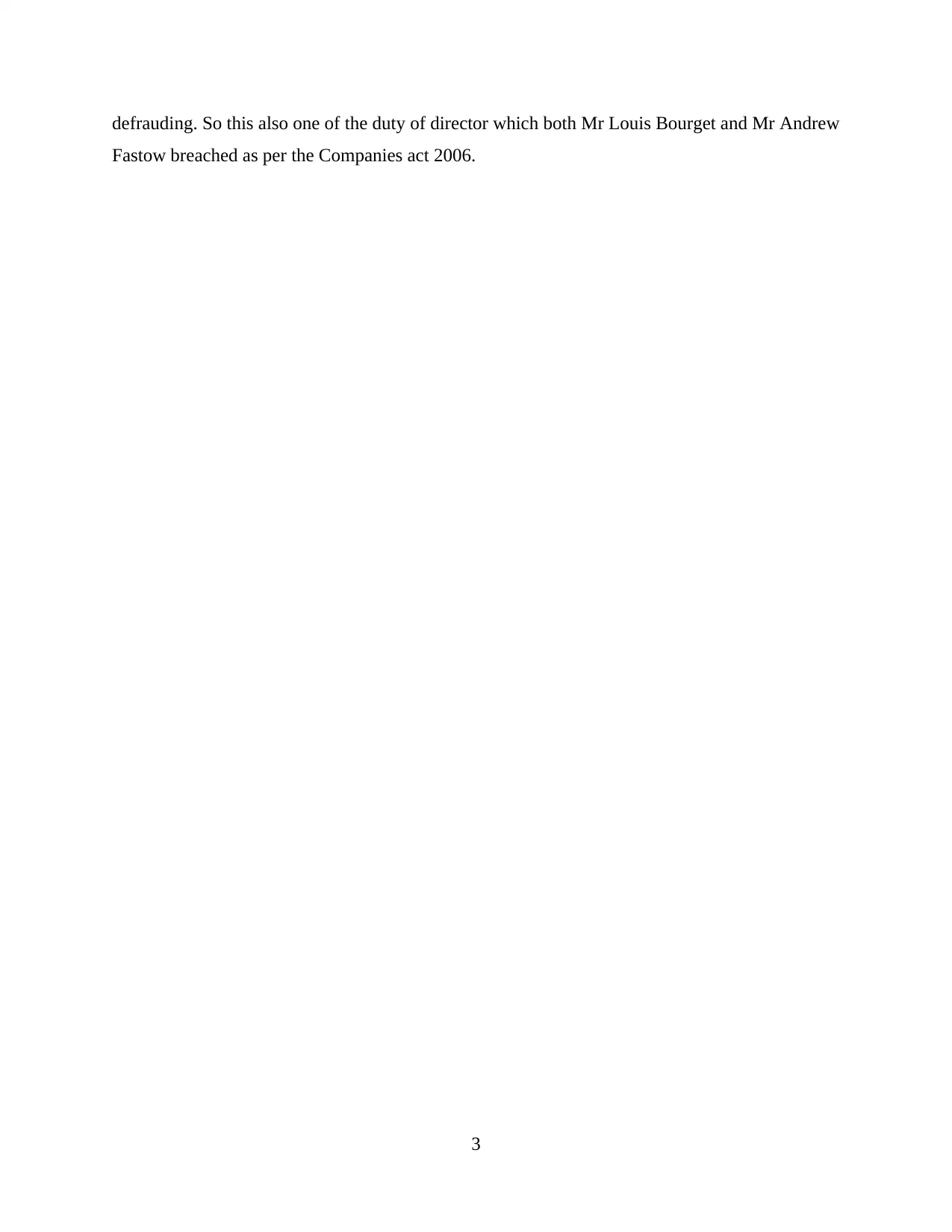
defrauding. So this also one of the duty of director which both Mr Louis Bourget and Mr Andrew
Fastow breached as per the Companies act 2006.
3
Fastow breached as per the Companies act 2006.
3
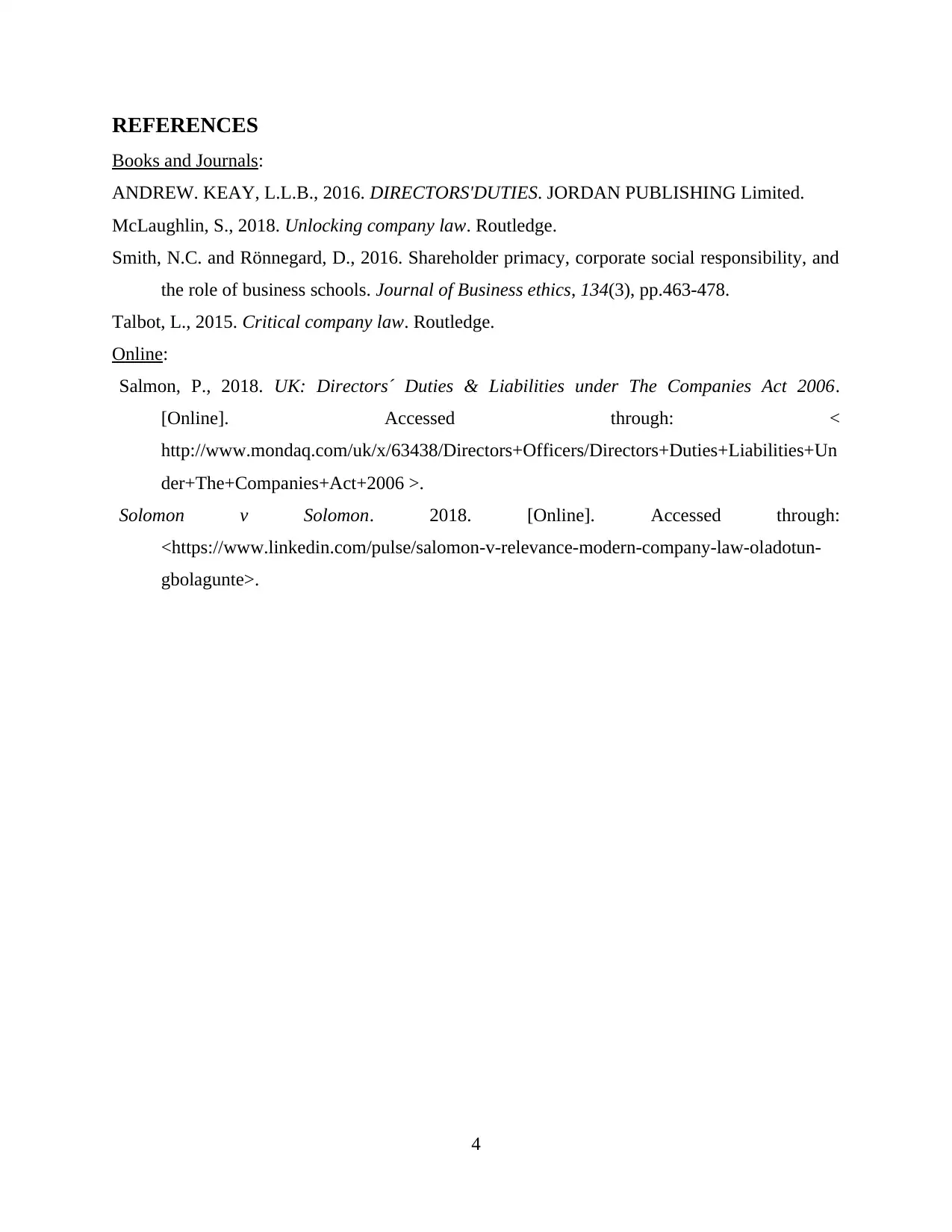
REFERENCES
Books and Journals:
ANDREW. KEAY, L.L.B., 2016. DIRECTORS'DUTIES. JORDAN PUBLISHING Limited.
McLaughlin, S., 2018. Unlocking company law. Routledge.
Smith, N.C. and Rönnegard, D., 2016. Shareholder primacy, corporate social responsibility, and
the role of business schools. Journal of Business ethics, 134(3), pp.463-478.
Talbot, L., 2015. Critical company law. Routledge.
Online:
Salmon, P., 2018. UK: Directors´ Duties & Liabilities under The Companies Act 2006.
[Online]. Accessed through: <
http://www.mondaq.com/uk/x/63438/Directors+Officers/Directors+Duties+Liabilities+Un
der+The+Companies+Act+2006 >.
Solomon v Solomon. 2018. [Online]. Accessed through:
<https://www.linkedin.com/pulse/salomon-v-relevance-modern-company-law-oladotun-
gbolagunte>.
4
Books and Journals:
ANDREW. KEAY, L.L.B., 2016. DIRECTORS'DUTIES. JORDAN PUBLISHING Limited.
McLaughlin, S., 2018. Unlocking company law. Routledge.
Smith, N.C. and Rönnegard, D., 2016. Shareholder primacy, corporate social responsibility, and
the role of business schools. Journal of Business ethics, 134(3), pp.463-478.
Talbot, L., 2015. Critical company law. Routledge.
Online:
Salmon, P., 2018. UK: Directors´ Duties & Liabilities under The Companies Act 2006.
[Online]. Accessed through: <
http://www.mondaq.com/uk/x/63438/Directors+Officers/Directors+Duties+Liabilities+Un
der+The+Companies+Act+2006 >.
Solomon v Solomon. 2018. [Online]. Accessed through:
<https://www.linkedin.com/pulse/salomon-v-relevance-modern-company-law-oladotun-
gbolagunte>.
4
⊘ This is a preview!⊘
Do you want full access?
Subscribe today to unlock all pages.

Trusted by 1+ million students worldwide
1 out of 6
Related Documents
Your All-in-One AI-Powered Toolkit for Academic Success.
+13062052269
info@desklib.com
Available 24*7 on WhatsApp / Email
![[object Object]](/_next/static/media/star-bottom.7253800d.svg)
Unlock your academic potential
Copyright © 2020–2025 A2Z Services. All Rights Reserved. Developed and managed by ZUCOL.





